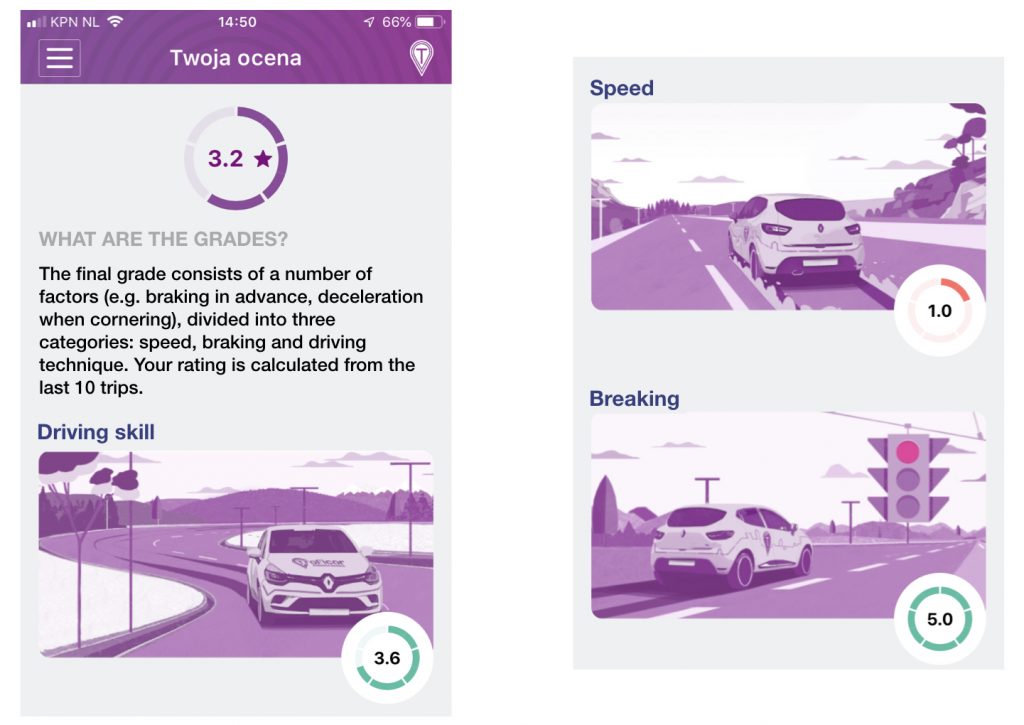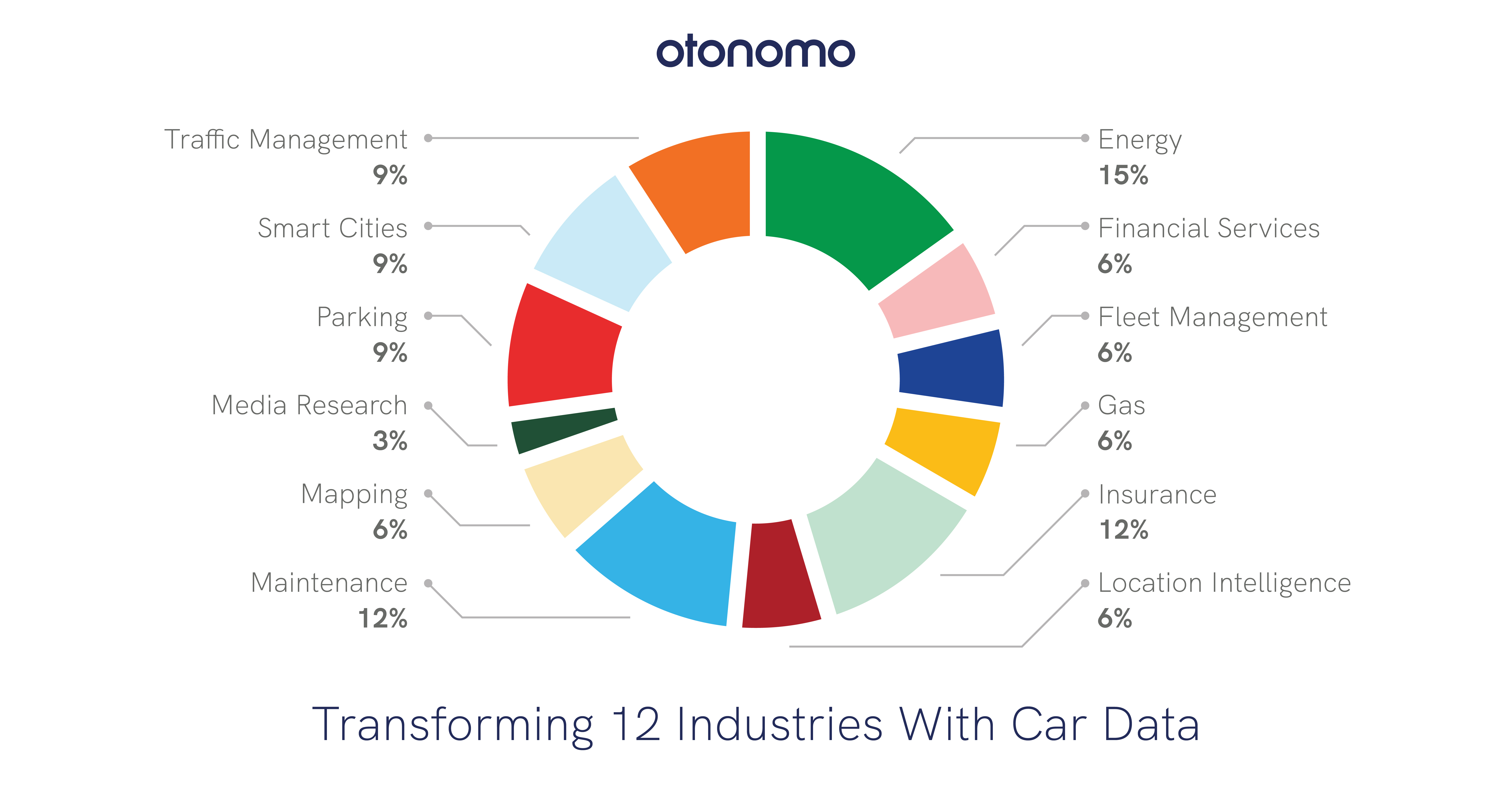Car data: what does your car know about you?

Case study: Carsharing platform
European carsharing market is constantly growing, new cars and mobility possibilities arrive in different cities across the continent. The system is based on a mobile app displaying a map of the neighborhood, showing available cars and the basic information about them (e.g. fuel level). The user rents the car, paying for every minute and each kilometer of the ride. Fuel and public parking are covered within the price. The area where you can finish your rent is limited, and you cannot leave the car in a different city (even if platform also operates there as well). After the ride, the driver uses the app to shut the vehicle.
For some it may seem that the costs of upkeeping the vehicles and covering all the fixed costs is higher than the total revenue of renting out the cars. Even if the cars are meant to be rented frequently for short periods of time, still the money income may not cover fixed costs of the maintenance. That is why, the platforms collect data about its users. For example, one of the Polish carsharing company Traficar, undertakes a ranking of the driver’s performance. Based on the ten last rent outs the app displays an overall grade based on three categories: driving skill, speed and breaking. Furthermore, the car is equipped with sensors recognizing that the hand break is not in use, and that the key was not returned to the designated place. Data about different actors, undertaking the same activity in a limited geographical space, could be a valuable resource with a potential for monetization.

The platform theory
Benjamin Bratton in his book “The Stack” brings up the theory of a platform, claiming that a platform is a standardized institution allowing self-driven actors for “unplannable events.” (44) Referring to monetizing, the author writes that “an economically sustainable platform is one for which the costs of providing systemic mediation are, in the aggregate, less than the total values of input User information for the platform.” (48) He also defines a platform ‘surplus’: “that is the differential value of all User information for the platform is greater than the costs of providing the platform to user” (48). Knowing, that the carsharing platform collects data from the users, rating their driving skills, keeping record of the current GPS position and monitoring car’s components, it becomes clear that the vehicle provider may not profit only form the money income, but profit from the users’ activities data.
Furthermore, Nick Srnicek in his book “Platform Capitalism” outlines that “in the twenty-first century advanced capitalism came to be centered upon extracting and using a particular kind of raw material: data” (Srnicek, 32). Later he adds that user’s activities are the natural source of the material, that after being processed can be sold to advertisers and other companies. “Turning simple activities into recorded data became increasingly cheap; and the move to digital-based communications made recording exceedingly simple” (33). The carsharing platforms are a good example of that: the company obtains the valuable material from its basic purpose, getting an asset on a very low cost.
Car data monetization
Jonathan M. Gitlinh in his Ars Technica article elaborates more about the worldwide occurrence of car data collecting: “connected cars are generating car data attributes that specify location, engine status, if a door was locked, speed, and much more. Car data is generated from the vehicle’s electronic control units (ECUs), Controller Access Networks (CANs), and even infotainment systems.” (Glitlinh)
Gitlinh introduces a company Otonomo. Their business model is based on gathering car data from different providers, analyzing and clarifying it and selling to different partners from different industries. Ben Volkov, Otonomo’s CEO writes on his blog that in September 2019 they cooperate with 12 partners from different industries, where the car data could be used. (Volkov) As Gitlinh quotes Volkov, “by the end of 2020, there will be 255 million connected cars on the road — that is, computerized and sending data to the cloud.” (Glitlinh)

Let’s now have a look at particular examples of the car data usage mentioned by Volkov. Otonomo cooperates with an American company called Drive Time Metrics. As they point out on their website: “More audio listening is done in cars than anywhere else, yet no one knows what people are actually listening to”. As the business’s founder writes in his blog post, the phenomenon of wide spread car data is “an exciting opportunity to utilize data collected from a vehicle’s infotainment system for application to the media industry, including for advertising-related analytics.” (Maccini) The audio data can be monetized in regard to the radio/Spotify (or other music platform) usage ratio, audience characteristics and preference. The data could serve in radio stations market research. The information provided could be also useful in the advertisement market in order to investigate if the ad was heard in the vehicle and what was its outcome. As carsharing platform provide short rides within the urban areas, using data derived from these vehicles could be useful in focusing on a certain target group, coming from a specific geographical area, holding simmilar characteristics.
Insurance purposes are another interesting example of a commercial car data use. Otonomo cooperates with insurance companies providing them data of driving behavior. Car data allows the insurances to be more accurate in cost estimation leading to new product models Pay How You Drive (PHYD) and Pay as You Drive (PAYD) (otonomo.io). The second one allows the customer to get additional insurance for a shorter period of time. Additionally, having the knowledge of how one performs as a driver the corporations can be more rigorous towards the customer, in terms of punishment and their services pricing. Again, carsharing data may be useful for the marketers as it determines information for a limited area with a counted number of users. It may provide answers to what are the general driving behaviors in certain cities. The data may differ regarding the size of the urban area and popularity of the platform.
Your car knows what kind of music you are listening to, it knows when you drive too fast and that you have forgotten to use the hand break when parking. Carsharing vehicles also provide information, but additionally being based in a standardized platform, with a counted actors performing in one named urban area, that data could be particularly useful for the marketers and their further research.
Otonomo claims to be depersonalizing the data they sell to their partners and carsharing platforms have various privacy rules, still the biggest companies benefit from citizens’ everyday life. Referring back to Srnicek: “the twenty-first century advanced capitalism” at its finest!
References:
- Bratton, Benjamin H. The Stack – On Software And Sovereignty. MIT Press, 2016.
- Srnicek, Nick. Platform Capitalism. Polity, 2016, pp. 32-33, https://www.amazon.com/Platform-Capitalism-Theory-Redux-Srnicek-ebook-dp-B01N7L90SC/dp/B01N7L90SC/ref=mt_kindle?_encoding=UTF8&me=&qid=. Accessed 22 Sept 2019.
- Gitlin, Jonathan. “Car Companies Are Preparing to Sell Driver Data To The Highest Bidder”. Ars Technica, 2018, https://arstechnica.com/cars/2018/02/no-one-has-a-clue-whats-happening-with-their-connected-cars-data/. Accessed 22 Sept 2019.
- Volkow, Ben. “We’re Collaborating With 12 Industries to Transform Their Business With Car Data”. Otonomo, 2019, • https://otonomo.io/were-collaborating-with-12-industries-to-transform-their-business-with-car-data/. Accessed 22 Sept 2019.
- “Audio Measurement Via Connected Car”. Drivetimemetrics.Com, 2019, https://www.drivetimemetrics.com/.
- Maccini, Bob. “Connected Vehicle Data Will Revolutionize Audio Industry”. Street Fight, 2019, https://streetfightmag.com/2019/08/27/connected-vehicle-data-will-revolutionize-audio-industry/. Accessed 22 Sept 2019.
- Otonomo.Io, 2019, https://otonomo.io/wp-content/uploads/2019/07/Automotive-Data-for-the-Insurance-Industry.pdf. Accessed 22 Sept 2019.